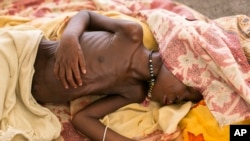There are 7 million malnourished children under age 5 worldwide, according to the World Health Organization. Of these, one-third die either from the direct effects of starvation or from infectious diseases that stalk the very young weakened by lack of food.
The highest proportion of these children lives in the developing world.
Scientists like Revati K. Phalkey, a public health expert at the University of Heidelberg in Germany, predict the lives of millions more children will be put at risk in the future because of hunger and a lack of nutrients tied to climate change.
“What we are trying to say is that climate change by the year 2050 is going to add an additional 25 million children who are going to be undernourished, principally in Asia and sub-Saharan Africa.”
Phalkey co-authored an article published in Proceedings of the National Academy of Sciences that reviewed 15 papers examining the impact of global climate change on nutrition. Eighty percent of the studies concluded that extreme weather conditions would destroy crops that are the primary source of sustenance for young children worldwide.
"We will have more extreme weather events," said Phalkey's colleague, Rainer Sauerborn, senior author of the PNAS article. "We will have torrential rainfalls, we will have droughts, we will have shifts in seasonalities — for example, later [arrival] of the rainy season, then stopping of rainfalls — and all this, our colleagues from agriculture tell us, ends in reducing the crop yields."
Sauerborn and Phalkey spoke from Burkina Faso, a West African country that has one of the world's highest incidences of child malnutrition.
“We are trying to put the health argument in the center and saying, 'Look, people care about koala bears and about ice bears, but most people care much more about the children and their malnourished children and diseases of grandchildren and great-grandchildren,' because they are going to suffer from this," Sauerborn said.
International talks aimed at an agreement to slow the rate of greenhouse gas emissions, and hence the pace of climate change, are scheduled to take place in Paris at the end of the year.












